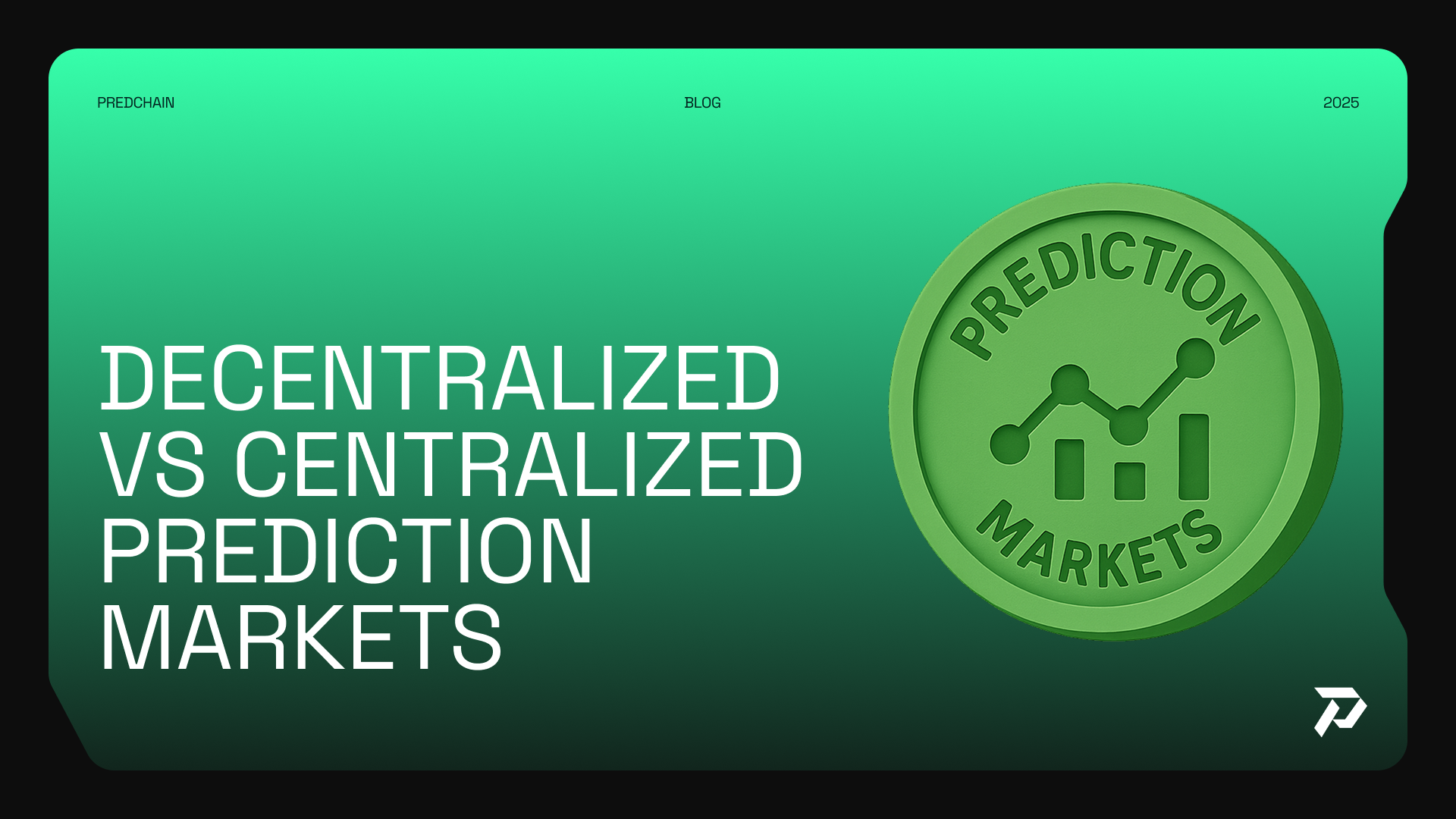Decentralized vs Centralized Prediction Markets: Pros and Cons

Quick Answer
- Centralized prediction markets are managed by a single platform or operator. They offer faster trade execution and customer support but come with less transparency and potential control risks.
- Decentralized prediction markets operate on blockchain technology, providing permissionless access, transparency, and trustless execution, though they often face challenges like lower liquidity and a steeper learning curve.
Centralized Prediction Markets
Centralized prediction markets are traditional platforms that control all aspects of market creation, trade execution, and event resolution. Examples include Polymarket (before its transition), PredictIt, and proprietary exchanges.
Pros of Centralized Markets
- Fast Trade Execution and Resolution: Operators manage order books and event outcomes directly, enabling quick settlements and withdrawals.
- Higher Liquidity: Concentrated user bases provide more liquidity, reducing slippage and improving price efficiency.
- User-Friendly Interfaces: Often designed for accessibility, with intuitive UX, clear customer support, and fiat onramps.
- Regulatory Compliance: Centralized platforms may comply with local regulations, offering a sense of legal security.
Cons of Centralized Markets
- Operator Control and Trust Risks: Platforms can influence markets, freeze accounts, or censor certain events, reducing user autonomy.
- Limited Event Types: Focused mainly on mainstream sports, politics, or finance, restricting creative or niche markets.
- Withdrawal and Account Restrictions: Users may face limits on fund withdrawals or mandatory identity verification, impacting privacy and control.
- Single Points of Failure: Centralized control creates vulnerability to hacks, downtime, or regulatory shutdowns.
Decentralized Prediction Markets
Decentralized markets utilize blockchain technology and smart contracts to enable peer-to-peer trading without intermediaries. Examples include Augur, Omen, Gnosis, and emerging platforms like Predchain.
Pros of Decentralized Markets
- Full Transparency and Trustlessness: Market rules, trade history, and resolutions occur on-chain and are publicly verifiable.
- Permissionless Market Creation: Users can create markets on virtually any topic—from mainstream sports to crypto events or niche cultural phenomena.
- Ownership and Control: Traders retain custody of funds with no central authority able to freeze or censor assets.
- Potential to Earn Fees as Market Creators: Platforms like Predchain reward liquidity providers and market creators with trading fees.
- Censorship Resistance: Markets resist external interference, supporting freedom of expression.
Cons of Decentralized Markets
- Lower Initial Liquidity: New or niche markets may experience low trading volumes, causing higher slippage and less efficient pricing.
- Steeper Learning Curve: Users need basic knowledge of crypto wallets, blockchain transactions, and gas fees, which may deter newcomers.
- Oracle and Smart Contract Risks: Market resolution relies on decentralized oracles or smart contracts, which must be secure and accurate; failures can lead to disputes.
- Slower Trade Execution and Costs: Blockchain transactions may introduce latency and fees, especially during network congestion.
Practical Takeaway: Which One Should You Choose?
- Choose centralized prediction markets if you prioritize:
- Speed
- Liquidity
- Ease of use
- Customer support
Ideal for casual traders or those less familiar with crypto.
- Choose decentralized prediction markets if you value:
- Transparency
- Privacy
- Ownership of funds
- Ability to create or participate in custom markets on any topic
Best for tech-savvy users and those prioritizing censorship resistance.
For hands-on learning, trading with minimal capital, or creating custom decentralized markets, Predchain offers an accessible and user-incentivized platform designed to maximize decentralization benefits while mitigating common challenges.